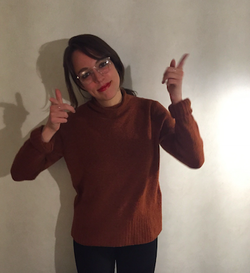
Hi, I'm Becca. I am the non-fiction book critic of the Washington Post, an editor at The Point, and a contributing editor at The Boston Review . My essay collection, All Things Are Too Small, was published Metropolitan Books in the US and Virago in the UK in April 2024. The New York Times called it "splendidly immodest" and "exhilarating" and The Guardian called it "bracing and brilliant." It was a New York Times editors' pick and a New Yorker weekly recommendation. Finally, I am also a PhD candidate (on indefinite hiatus) in philosophy at Harvard, but i remain perhaps delusionally convinced that someday I will finish my dissertation. These days I live in Washington, DC, with this person, whom I love. Here you can find all of my Washington Post pieces, which will come out each week, generally speaking.
To keep up with my writing/rantings, subscribe to my substack here. As a writer: I have contributed essays, book reviews, and the occasional art review to publications like The TLS, The Nation, The New York Times Book Review, The New Yorker, The Atlantic, Liberties, Bookforum, Art in America, The Yale Review, The Baffler, and more. These days, I write mostly for the Washington Post about non-fiction, but occasionally I write essays on fiction and whatever else for other venues. I am the winner of the first annual Robert B. Silvers Prize for Literary Criticism (see more here) and the 2023 Nona Balakian Citation for Excellence in Reviewing (see more here). In 2017, I was a finalist for a National Magazine Award in the essays/criticism category. A few authors I especially love are Joseph Roth, Italo Svevo, Henry James, Henry Green, Heinrich von Kleist, Marie de France, and Norman Rush. My agent is Anna Sproul-Latimer of Neon Literary. As a (lapsed?) philosopher: I am primarily interested in aesthetics (especially aesthetic value and its relationship to other types of value), the philosophy of love and sex, and the history of German philosophy, especially Martin Heidegger, although I have increasingly consuming secondary interests in political philosophy. In "The Good, the Bad, and the Ugly," published in The British Journal of Aesthetics, I defend aestheticism, the view that aesthetic value is sometimes a partial grounds of moral value. I describe aestheticism in more detail in a chapter in the Oxford Handbook of Ethics and Art. If I ever get around to completing it, my dissertation will be about some combination of the following: what it is to be a beautiful person, why evolutionary psychologists are wrong about human beauty, the ethics of exclusionary romantic/sexual/aesthetic preferences, and what role the state should play in ameliorating inequitable distributions of intimate "goods." I hold a first-class MPhil in the history and philosophy of science from the University of Cambridge and a B.A., summa cum laude with high honors, from Dartmouth College, where I studied philosophy & German (and cultivated an enduring distaste for fraternities). I receive many emails asking for advice about graduate school applications. I have answered some frequently asked questions on this page. As I note there, I do not consider myself an expert in how to write a successful graduate school application, and I urge all prospective grad students to consult resources online, as well as supervisors who have served on admissions committees, rather than me! Before the pandemic, I followed Hegel in regarding nature as geistlos, but now, like any good Heideggerian, I am a big fan of hiking. Here I am in the Berkshires, which I love
|
|
with the amazing Justin Smith! [Insert obligatory comment about how much I hate my voice here]. You can listen here (if you can stomach my voice): https://whatisx.thepointmag.com/1827398/9639883-what-is-art-becca-rothfeld
0 Comments
WHEN SHE WAS SIXTEEN, THE FRENCH NOVELIST Anne Serre set out to induce her high school philosophy teacher to fall in love with her. Her strategy was unconventional: “I thought that writing a book, which I would then ask him to read, was the only possible way of seducing Monsieur Rebours,” she recounted in the Times Literary Supplement last year. Though Monsieur Rebours did not succumb, Serre, now sixty-one, remains convinced that books are instruments of seduction. “Fiction, realist or not, doesn’t try to convince but to seduce,” she explained in a recent interview. “A writer’s only responsibility is to seduce without cheating.” Read more here.
am not a model or a celebrity, but my image has been stolen from me. When I was 17, a high school boyfriend disseminated the nude pictures I had sent him to what felt like everyone I had ever met, as well as a number of people I hadn’t. The prurient Facebook messages that flooded my inbox were daily reminders that my body was not my own. It belonged to men on the internet; I only lived inside it.
What happened to me also happened, albeit on a much grander scale, to the famously desirable model and actor Emily Ratajkowski. As she recounts in her debut essay collection, My Body, a fashion photographer who took nude pictures of her when she was young, drunk and vulnerable persists in selling books of the Polaroids. Read more here. In The Use of Man (1976), the second instalment of Serbo-Croatian novelist Aleksandar Tišma’s Novi Sad trilogy, a schoolboy stares at the books in his Jewish neighbour’s library on the eve of World War II ‘as if they contained the clues to salvation, as if they could rescue one from being beaten, cursed, spat upon, killed’. The books, it turns out, can do no such thing: the neighbour is murdered by the Nazis, while his daughter, Vera, is forcibly sterilized and put to work in a concentration camp brothel. Are words just so much dust in times as dire as these?
Tišma does not think so. For his characters, language is no mere luxury: it is, in its own way, as indispensable as food and shelter, for it is only language that can render a private pain public. After the war, Vera yearns to confide in someone, but her memories remain ‘stuck inside her, silent, like resin’. When she is asked to write out her biography on a communist questionnaire, she finds herself trying ‘to put the unutterable on paper’. In the end, she crosses out, ‘in thick ink, every word she had written’. She annihilates first her family, then herself: ‘Father’s name: nothing. Mother’s name, maiden name: nothing. Day, month, year of birth: nothing. She was nothing’. Now, she is ‘a prisoner of those blank sheets of paper, as she had been a prisoner in the camp’. She has been exiled from intelligibility, thereby from human community. Read more here. One of the least interesting things a woman can do vis-à-vis sex is consent to it—yet lately, we seem to have less to say about female erotics than we do about male abuses.
On the one hand, it is not hard to understand why consent and its absence are at the forefront of mainstream conversation. A focus on rape and assault is warranted in a culture where sexual crimes are so tragically common: one in every six women in the United States is the victim of rape or attempted rape, and 81 percent of women have experienced some form of sexual harassment. In the public imagination, sexual agency is mostly reserved for male philanders and predators; female pleasure is alien at best. Still, hollow consent, unaccompanied by inner aching, is at least as ubiquitous as sexual coercion. Sex that is merely consensual is about as rousing as food that is merely edible, as drab as a cake without icing. Even in our era of ostensible liberation, women face emotional and social pressures, both externally imposed and uneasily internalized, to appease men at the cost of their own enjoyment. Heterosexual women are forever licensing liaisons that don’t excite them—perhaps because they have despaired of discovering anything as exotic as an exciting man, or because it no longer even occurs to them to insist on their own excitement, or because capitulation to unexciting men is so exhaustingly expected of them and so universally glorified in popular depictions of romance. As the formidable Oxford philosopher Amia Srinivasan writes in her debut essay collection, The Right to Sex, her female students regularly report that they regard their erotic lives as “at once inevitable and insufficient.” In short, the young women in Srinivasan’s classes are resigned to sex that is consensual but underwhelming. Read more here. One of contemporary analytic philosophy’s most persistent pathologies is its mania for “domestication”—that is, for the translation of Continental effusions into a cooler, cleaner vocabulary. Sometimes, domestication is merely a matter of untangling the terminological knots that make thinkers like Heidegger and Hegel so daunting to Anglophone audiences. Often, however, the practice involves the taming of ideas themselves, as if they were so many unruly animals. The domesticator offers up such morsels as a secularized Kierkegaard, or a Pascal who is more of a protoexistentialist than a Jansenist. What is lost in verve, domesticators claim, is gained in newfound plausibility, at least when the relevant arbiters are the atheistic liberals who preside over present-day academia. Read more here.
We know a lesser life does not seem lesser to the person who leads one,” wrote the novelist and critic Diane Johnson in 1972. “His life is very real to him; he is not a minor figure in it.” This wise and witty insight appears in The True History of the First Mrs. Meredith and Other Lesser Lives, Johnson’s monograph on Mary Ellen Peacock Meredith. The adulterous wife of the celebrated Victorian writer George Meredith, the spirited Mary Ellen is one of many “lesser” figures, all too frequently female, who have been more or less excised from the historical record. Johnson’s masterful biography paints an evocative portrait of a woman with grand intellectual ambitions—and thereby dignifies a figure first vilified and then forgotten by most chroniclers of the period. Read more here.
I wrote about how the pandemic changed my experience of graduate school for the Chronicle Review6/15/2021 Before the pandemic, I spent most of graduate school contriving to avoid attending or delivering talks. I had no desire to hear the scholars I admired speaking. After all, why should I? It’s not that academics are necessarily clumsy orators — though I myself happen to be a particularly wretched one — it’s just that facility for writing and facility for talking have virtually nothing to do with each other. The author of an astute paper or an elegant monograph is, if anything, apt to prove worse at talking than an ordinary, uninhibited person, given that she is almost certainly in the habit of laboring over obstinate sentences for weeks. Read more here.
|
Archives
June 2022
Categories |

 RSS Feed
RSS Feed